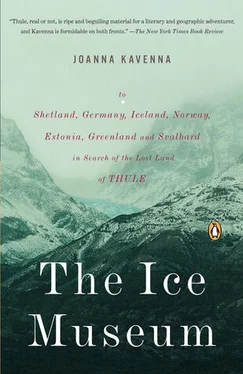The other major smiled and said: ‘You won’t see the difference after the upgrade. The base won’t look any different. Operations might change a little.’
In the far north, the US Military was watching a band of sky. The purpose of the base had changed: during the Cold War it was a place where nuclear bombers could land on their way to an attack. Now it was a defensive station, watching the world, so the US government could anticipate an attack.
‘Watching who?’ I asked, and they laughed and shook their heads.
‘We watch whatever we are ordered to watch,’ said a major, a phrase like a tongue twister, but he showed no signs of stuttering.
There was a pause while we rattled across a pile of stones, and then the other major said, ‘We watch for speed. A particular sort of height and speed. We saw the Russians doing missile tests in the Barents Sea a while back. Other than that it’s pretty quiet round here.’
He smiled. Behind the robust forms of the majors, I could see the pale blue waters of the sea, and the white mountains along the coast. The barracks shone in the weak sunlight. In the distance a cluster of satellite dishes stood among the ice-covered rocks.
We stood outside the van, while the majors pointed at dusty patches of ice, scattering acronyms across the view, and when everyone was shuddering and clapping their hands in the cold, the majors stepped back into the van and beckoned to me to follow them. ‘If you don’t mind,’ they said, politely. They smiled and slammed the doors shut.
We scuffed along the rubble tracks, back into the base. The streets were made of dust rocks, and the buildings were all stamped with their functions: GYM, RADIO STATION, SHOP. Behind the closed doors, the barracks were full of soldiers, moving from the luxury gym to their posts. A few soldiers, a few purposeful apparitions in uniform, hurried out of one building into another. Community, the majors kept saying. Against the bitterness of the cold, the vastness of the wilderness, Thule Air Base released its key strategy: society, like a military tactic, spun around the men, lifting them above the void. ‘We are preparing for a setting of the sun party,’ said the major. ‘In the spring we will have a rising of the sun party,’ he added. ‘Fancy dress. Concerts, bands invited. Greenlandic choirs. Leather-making workshops, ceramics workshops, woodwork, pottery societies. You can take the stuff home,’ said the major. ‘Made in Thule.’
‘And anyway we only stay for a year,’ said the other major. ‘You can’t get too sad in a year. It’s just one winter, one period without sunlight, and then there’s the summer.’ And he smiled.
‘And the cold? The relentless biting, frigid air, the constant darkness in the winter?’ I asked.
They shrugged. ‘It wasn’t so bad,’ they said, smiling.
‘In the summer, you can go for long hikes,’ said a major. ‘In the winter, of course, there are serious storms, so you can’t go out so much. But in a way that’s when the community is most close, because everyone is around all the time. People can’t do stuff on their own. I’m kind of used to this sort of cold—I come from North Dakota. But we still have to be very careful. And in case people get depressed during the long winter months, we have very bright lights, all around the base, so you can go about your business, as if there’s ordinary daylight.’
‘Do you ever regret coming here?’ I asked.
‘I do have one regret,’ said the other. ‘When I came, I forgot to bring a good fancy dress costume. Anyone who comes here, I’d say that’s an essential. Everything else you can buy, but a good fancy dress costume, it’s worth its weight in gold. If I’d just had a Hawaiian shirt, or a great hat . . .’ and he tailed off, imagining the perfect costume.
We walked around the supermarket, which was full of kitchen equipment, mugs and hats and T-shirts with GREENLAND or THULE AIR BASE stamped on them, cut-cost alcohol, tax-free cigarettes.
‘Perhaps,’ said one of the majors, smiling, ‘you might like to buy this?’ And he held up a cup which had THULE AIR BASE painted on it, with a picture of an Inuit with a sledge and dogs.
So I bought the cup.
Then they pushed through the doors of another low-rise barracks block, and there was a room lined with portraits of former commanders. In the next room there were photos of the base in 1951, rows of corrugated iron and steel, the same old snow, the blazing colours of the sunrise dulled into black and white. There was a page torn out of the New York Herald Tribune , from October 1951: THE US HAS TOP OF THE WORLD AIR BASE. CAN BOMB ANY PART OF EUROPE. In 1951 it was a major scoop.
There were two Danes wandering around the museum, trying to interest me in a bunk bed, part of the original accommodation for soldiers. One of them saw me looking at the newspaper article, and came over. He was about sixty, tall and stocky, with thick grey hair, dressed in a neat tracksuit. ‘When you read about it now, everyone says it was a secret at the beginning,’ he said, smiling shyly. ‘As if no one knew about it. But even the Russians knew, from the beginning; I remember a friend of mine told me he had heard about a piece on Russian radio, all about the Thule Air Base, and that was almost the same time as it was being built.’ He had been in Thule Air Base as a young man, he said. ‘I came to make money, like everyone. I was a civilian contractor.’ Now he had returned, for the same reason. ‘The money is not as good now, but it is still a lot. Really a lot.’ He laughed and scratched his head. The other Dane had been circling the room, looking slightly irritated, but now he came over and tried to show me the original air traffic control system. But I was walking straight towards the showpiece—a rusted piece of metal, standing in a room lined with photos. This was the emergency escape hatch from a B-52 bomber that crashed in the 1960s, spilling controversy across the ice. It had been carrying nuclear materials when it crashed. For years, it was claimed that the debris had been removed, but eventually they conceded that perhaps not everything had been found. A fragment, a small quantity of plutonium, might have been left on the seabed.
‘The crew ejected,’ said the Dane with the thick grey hair, ‘and this hatch was found two hours’ walk away from Thule Air Base. We had a fine job getting it back to the base,’ he said. He pointed at the dents and cracks in the metal.
The majors and I were walking along the street again, and I said: ‘Do you feel cut off from world events, stuck up here in the far north?’ They smiled politely, shaking their heads. ‘We do whatever we are asked to do . . . don’t choose our posting . . . happy to serve our country in any way possible,’ said one, mumbling slightly. ‘Part of the same operation . . . homeland security, national defence . . .’ And the other nodded slowly. For a moment, neither smiled.
We were back at the security station, and on the runway I could see the plane was ready to leave.
I wanted to stay longer; I was asking if I could stay a night, a week, but they all shook their heads.
‘Unfortunately . . . completely impossible . . . No one can stay, not even our wives . . .’ said the major, shaking his head.
‘Not even our mothers . . .’ said the other major, shaking his head.
‘The next plane isn’t for a week, so you’ll have to hop on this one,’ said the deputy commander, a tall affable man, who had just emerged from an office in the runway complex. A foot away, someone had taken my bag, and was searching through it. ‘Just routine,’ said one of the majors.
‘I’d love to talk,’ the deputy commander was saying. ‘But you have to go. You say Thule? You’re looking for Thule! Well you found it! You have a good flight now.’ He shook my hand, turned smartly and disappeared into his office.
Читать дальше












